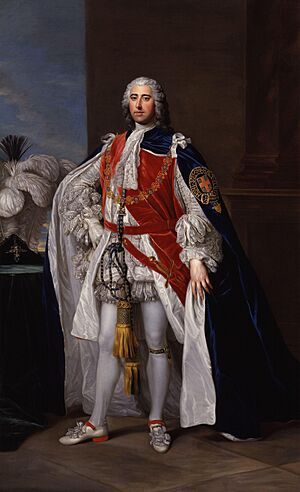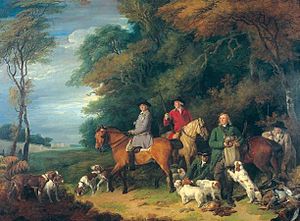Henry Pelham-Clinton, 2nd Duke of Newcastle facts for kids
Henry Fiennes Pelham-Clinton, 2nd Duke of Newcastle-under-Lyne (born 16 April 1720 – died 22 February 1794) was an important English nobleman. He was born in London. He was the second son of the 7th Earl of Lincoln.
Contents
Early Life and Family Power
Henry's father passed away in 1728. His older brother, the 8th Earl of Lincoln, died just two years later in 1730. This meant Henry became the 9th Earl of Lincoln when he was still a child.
His uncle, the 1st Duke of Newcastle-upon-Tyne, became his guardian. This uncle had no children of his own. So, he quickly decided that young Henry would be his heir.
Henry's uncle and his uncle's brother, Henry Pelham, were two of the most powerful people in England. Both of them even became Prime Minister. Henry's uncle had a lot of control over who got important jobs in the government. Because of this, Henry received many well-paying jobs that didn't require much work. These jobs gave him a lot of money. One of his main jobs was being the Controller of Customs for the port of London for his whole life.
On 16 October 1744, Lord Lincoln married his cousin, Catherine Pelham. She was the daughter of his uncle, Henry Pelham, who was Prime Minister at the time. They signed an agreement that made Lord Lincoln the heir to both of his powerful uncles. Through his uncles, he also got a special job at the King's court. He became a gentleman who attended to the King. In 1752, he was made a Knight of the Garter, which is a very high honor.
Becoming a Duke
In 1756, his uncle, who was already the Duke of Newcastle-upon-Tyne, asked King George II for something special. He wanted to also be made the Duke of Newcastle-under-Lyne. He asked that this new title could be passed down to his nephew, Lord Lincoln, instead of ending with him. King George II agreed to this request.
When his uncle died in 1768, Lord Lincoln officially became the 2nd Duke of Newcastle-under-Lyne.
Political Influence
The new Duke mostly stayed out of politics. However, he was very influential in two important situations. He had a lot of power because he controlled several seats in Parliament. This meant he could tell certain Members of Parliament (MPs) how to vote.
He used his influence to help his cousin, Sir Henry Clinton. Sir Henry was an army officer. The Duke worked hard to get Sir Henry appointed as the commander of the British forces in America during the American Revolution. The Duke's own son, Thomas, even worked as an assistant to Sir Henry Clinton. In 1768, the Duke was also appointed to the Privy Council, a group of important advisors to the King.
In December 1783, King George III asked the Duke for his help. The King wanted him to support the new government led by William Pitt the Younger. Pitt was having trouble getting enough support in Parliament. Henry told the six MPs he controlled to vote for Pitt. This helped Pitt get enough votes to form his government.
The Duke passed away in 1794 in Westminster. He was 73 years old.
Legacy and Clumber Park
The Duke is best known today for creating Clumber Park. This was his large country estate in Nottinghamshire. He is also famous for the dog breed called the Clumber Spaniel, which was named after his estate.
Work on Clumber Park started in 1768. He had inherited the large estate from his uncle. He transformed four thousand acres of empty land into one of the most beautiful private parks in England. It included a large lake that was made by people. The huge house built there was taken down in 1938. However, the park is now owned by the National Trust. It is open for everyone to visit and enjoy.
Family Life
The Duke had four sons with his wife, Catherine, before she passed away at age 33:
- George Pelham-Clinton, Lord Clinton (born 1745 – died 1752)
- Henry Fiennes Pelham-Clinton, Earl of Lincoln (born 1750 – died 1778)
- Thomas Pelham-Clinton, 3rd Duke of Newcastle-under-Lyne (born 1752 – died 1795)
- Lord John Pelham-Clinton (died 1781)
 | Lonnie Johnson |
 | Granville Woods |
 | Lewis Howard Latimer |
 | James West |



